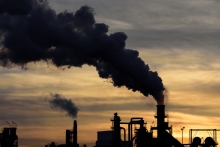Climate change is a hot-button issue in this federal campaign, and data shows that a party’s environmental strategy could help influence its results in at least 9 ridings where races were neck-and-neck in the last election. Environics Analytics analyzed all 338 Canada’s federal electoral districts and found environmental issues are important to a wide swath of Canadians. The data and analytics firm found that voters in 46 ridings had above average concerns – compared to the national average – for the way their lifestyles have an impact on the world around them.


In a recent study in PLOS ONE, researchers from 6 different countries, including Camilo Alejo and Catherine Potvin of the Department of Biology at McGill University, examined the importance of Indigenous Territories in climate change mitigation across Panama and the Amazon Basin.

More than 130 forest fires were burning in northwestern Ontario on Sunday, July 25, with Environment Canada issuing air quality statements for much of the region due to smoke. (CBC News)
Here are some experts from McGill University that can provide comment on this issue:
Mohammad Reza Alizadeh, PhD candidate, Department of Bioresource Engineering

The Arctic is warming at approximately twice the global rate. A new study led by researchers from McGill University finds that cold-adapted Arctic species, like the thick-billed murre, are especially vulnerable to heat stress caused by climate change.
“We discovered that murres have the lowest cooling efficiency ever reported in birds, which means they have an extremely poor ability to dissipate or lose heat,” says lead author Emily Choy, a Postdoctoral Fellow in the Natural Resource Sciences Department at McGill University.

A McGill-led study has shown that the size of the Maya population in the lowland city of Itzan (in present-day Guatemala) varied over time in response to climate change. The findings, published recently in Quaternary Science Reviews, show that both droughts and very wet periods led to important population declines.

A new study led by researchers from McGill University and INRAE found that between 51-60% of the 64 million kilometres of rivers and streams on Earth that they investigated stop flowing periodically, or run dry for part of the year. It is the first-ever empirically grounded effort to quantify the global distribution of non-perennial rivers and streams.

Forest fires have crept higher up mountains over the past few decades, scorching areas previously too wet to burn, according to researchers from McGill University. As wildfires advance uphill, a staggering 11% of all Western U.S. forests are now at risk.

May 27, 2021 | In this article by CBC News, Max Bell School professor Ken Boessenkool expresses support for the burgeoning conservative movement to translate carbon pricing revenues into lower personal income tax rates.

As the global community is called to re-examine our relationship to the natural world, one thing is certain: despite all our technological advances, humans are completely dependent on healthy and vibrant ecosystems for water, food, medicines, clothes, fuel, shelter, and energy, just to name a few. The 2021 theme, “We’re part of the solution”, was chosen to be a continuation of the momentum generated last year under the over-arching theme, “Our solutions are in nature”, which served as a reminder that biodiversity remains the answer to several sustainable development challenges.
Learn more on our Climate Change Artist in Residence Milton Riaño in the article from the McGill Reporter right here.

Tropical coral reefs are the most biodiverse underwater ecosystem, providing a home to more than a quarter of all marine species. No strangers to environmental stressors and the on-going impacts of climate change, the survival of corals has increasingly been under threat in recent years. A collective of researchers, including from McGill University, have analyzed how environmental factors influence the growth and health of corals and found that more species of corals are living in the mangrove forests than in nearby shallow reefs.

Climate change is exacerbating problems like habitat loss and temperatures swings that have already pushed many animal species to the brink. But can scientists predict which animals will be able to adapt and survive? Using genome sequencing, researchers from McGill University show that some fish, like the threespine stickleback, can adapt very rapidly to extreme seasonal changes. Their findings could help scientists forecast the evolutionary future of these populations.

Migratory waterbirds are particularly exposed to the effects of climate change at their breeding areas in the High Arctic and in Africa, according to a new study published in Bird Conservation International.

15 April, 2021 | In this panel conversation, Max Bell School director Chris Ragan shares his thoughts on the Conservative's newly revealed climate plan in a conversation with the Globe and Mail's Kelly Cryderman and political commentator Shakir Chambers.
Watch the panel. The panel discussion starts at 1:20:41.

“Our research shows that climate change is having substantial impacts on Arctic ecosystems, with consequences for exposure to toxic pollutants like mercury,” says co-author Jean-Pierre Desforges, a Postdoctoral Fellow [NRS] at McGill University under the supervision of Nil Basu [NRS/SHN] and Melissa McKinney [NRS].
